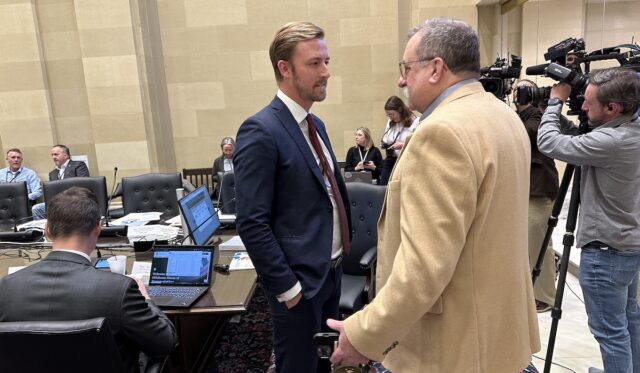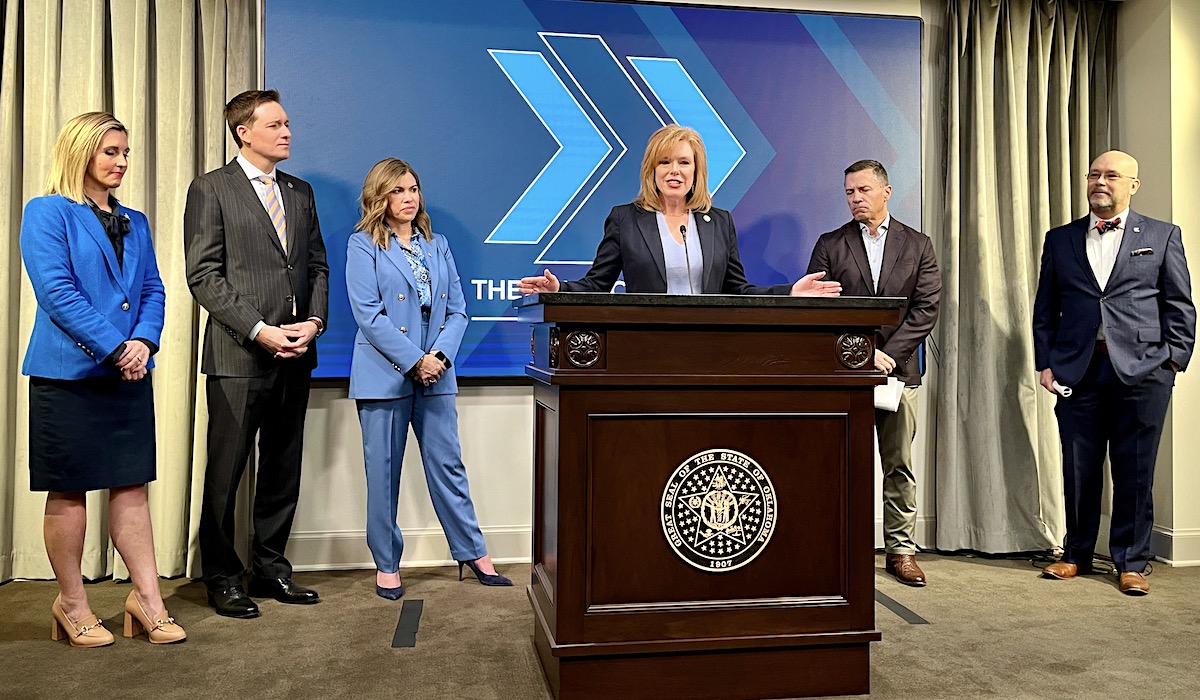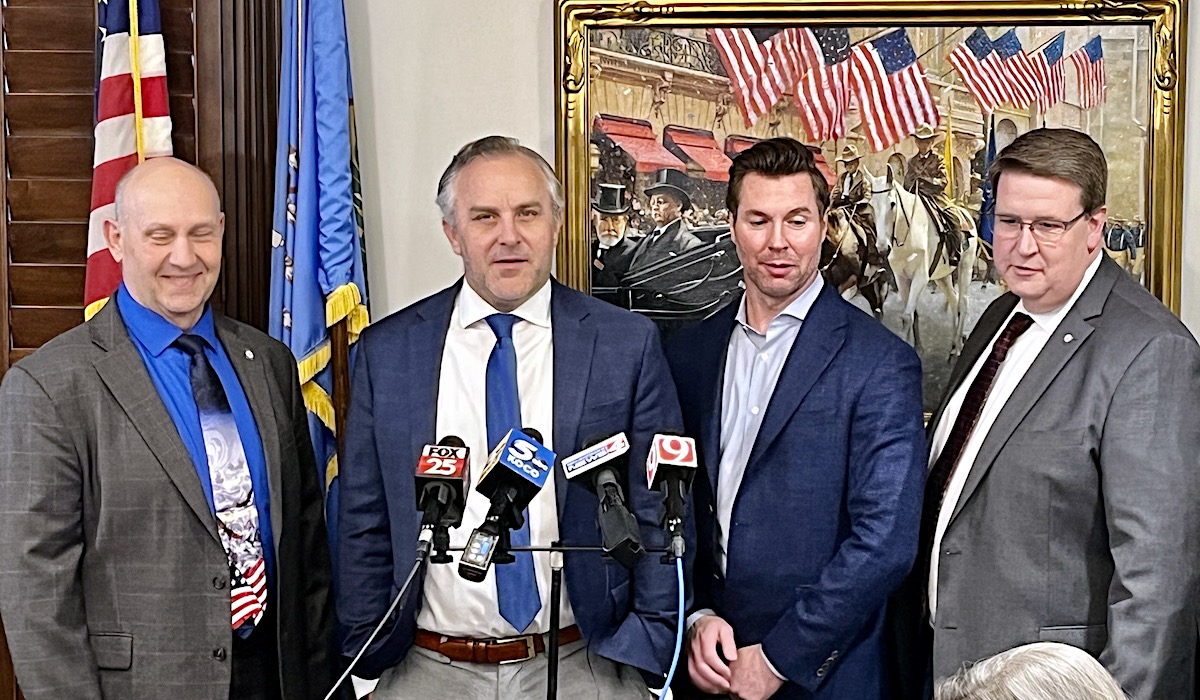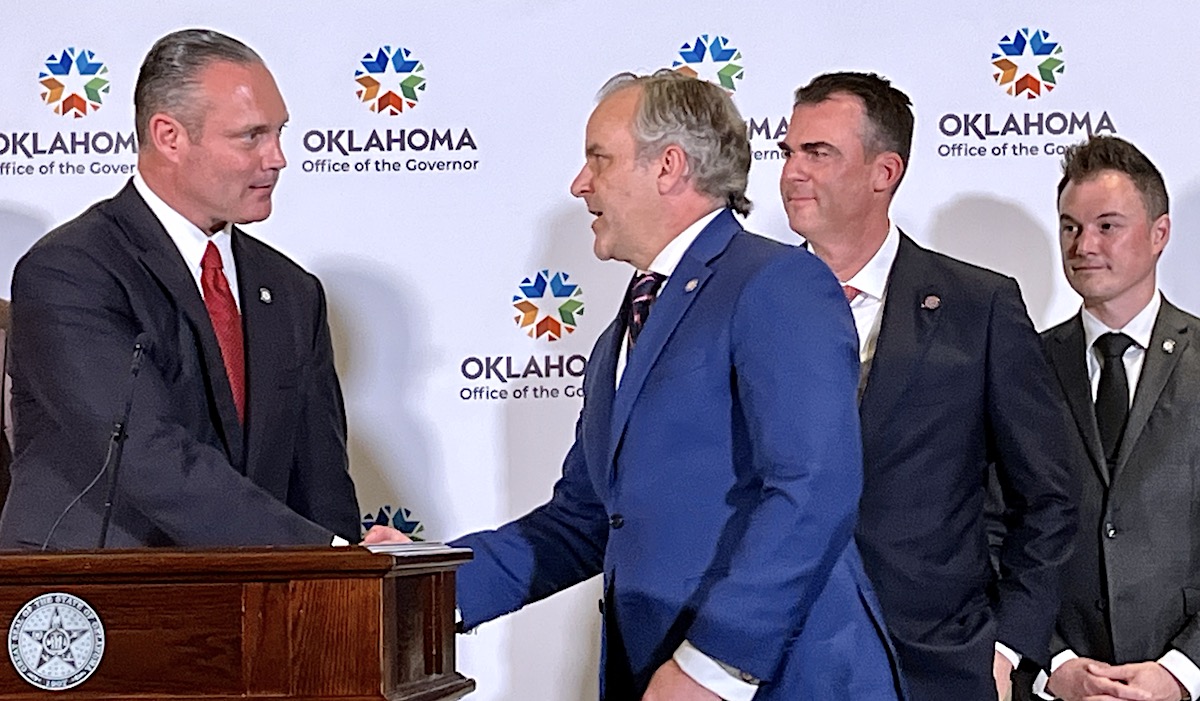
After a tumultuous regular 2023 legislative session featured tense education funding negotiations that created a special session, inflamed tensions in the Oklahoma State Capitol and ran out the clock on several other policy bills, House and Senate leaders seem to be expecting a less education-heavy 2024 session.
Additionally, Oklahoma State Superintendent of Public Instruction Ryan Walters presented a budget request to House and Senate committees devoid of references to “woke” or “left-wing indoctrination.” As regular session starts Monday and legislators begin crafting their Fiscal Year 2025 budget, some seem more open to working with Walters, who was not involved in last year’s negotiations.
“We had our education budget hearing, and I think that we’re going to be taking into consideration some of the priorities that Superintendent Walters had mentioned,” House Common Education Committee Chairwoman Rhonda Baker said Jan. 22. “He’s really about increasing the teacher pipeline — we could not agree more.”
Education leaders in both the House and the Senate have outlined some of their goals for the 2024 session after a series of agency budget hearings. Legislators said they plan on pushing measures to increase workforce development, increase options for students who might not attend college and decrease cell phone use during school.
Baker (R-Yukon) said one of her biggest priorities will be increasing pathways to graduation for high school students, allowing students to choose classes that best align with their goals after high school.
“The way it is now is it doesn’t matter what career pathway you’re going on, everybody takes the same thing,” Baker said. “What we’re finding is students don’t understand the relevancy of that course for their future goals, so they’re not doing well in those courses. We want to try to change that to where whatever pathway you’re going down, those courses need to be relevant to you.”
RELATED
Education deal: Teacher pay, maternity leave and formula tweaks to unlock tax credit bill by Tres Savage & Bennett Brinkman
Baker emphasized that she and others working to reform how students graduate believe that students should still be taking core classes.
“Does that mean that because they’re not going to be an English major, they’re not going to have to take English? Absolutely not,” Baker said. “They’re still going to have to have those core classes, but we’re trying to make it to where — especially in the math and that area — it’s becoming more relevant to them, because there’s a lot of ways you can learn math and be successful in a math course.”
Baker’s counterpart in the Senate, Education Committee Chairman Adam Pugh (R-Edmond), has a similar train of thought for his own education policy ideas.
“We need to think about what is the end goal of education,” Pugh said. “We can say it’s the altruism or the intrinsic value of education, which I certainly believe in, but our education system, whether it be [Kindergarten] through 12, career tech or higher ed, they’ve got to empower our kids with a skill set to go be whatever God has called them to be. That may be an engineer that requires a four-year degree. It may be, ‘I graduated high school, and I joined the military, but I’m prepared.'”
Using Norman Public Schools’ Aviation Academy as an example, Pugh said he wants to increase the number of workforce programs to which high school students have access.
“I’m all in on — No. 1 — on exposing the K-through-12 system — and specifically the kids that are there — to as many opportunities (as possible) in career fields,” Pugh said.
Although Pugh and Baker did not say they have worked together on their priorities, both have similar goals for reforming the options students have as they navigate high school.
“We just have to make sure that whatever route our students choose that it’s personalized for them so that they can achieve the success they need in whatever career path they’re going,” Baker said. “So that’s the ultimate goal.”
More math requirements, but ‘make it relevant’

Baker presented her workforce development ideas publicly during a State Chamber of Commerce press conference Jan. 25.
“As far as electives go, we’re going to make it more tailored toward pathways depending on [a student’s] career,” Baker said.
Flanked by other legislators touting State Chamber priorities such as expanding child care access and reforming the Department of Commerce, Baker said she wants to raise the state’s current math requirement from three to four credits for graduation. However, exactly what that would look like is far from being finalized.
“There is a whole lot of math that a student learns within a welding course. If they embed additional math applications in there, that’s going to be much more meaningful to that student,” Baker said. “So we are really trying to tailor the pathways to the student to make it relevant to them.”
Baker said one way she wants to diversify pathways to graduation involves increasing students’ access to the Oklahoma Career and Technology Education system. She praised new Career Tech director Brent Hakin.
“He has actually opened up more courses, more seats for students. So that waiting list has definitely shortened,” Baker said. “In the past, if a student was an athlete, oftentimes (…) based upon the way that the schedule was set, they couldn’t go to the Career Tech to access this. (…) We’re trying to break down those barriers.”
Pugh and other senators discussed their 2024 education priorities during a press conference this morning, releasing a list of education proposals including teacher pay raises, new pilot programs and school safety programs.
Pugh discussed SB 1395, a proposal to add four new seats on the State Board of Education, two of which would be appointed by the Senate president pro tempore and two of which would be appointed by the House speaker.
“Nearly half of our total budget (…) goes to education. And apart from the Senate confirmation process on the governor’s nominees, we really have no say in who serves on that board,” Pugh said. “And so this would expand that and leave those existing members in place, but actually add two from the House and two from the Senate, so that we will have representation on the state board, given that we are putting so much funding, and so much of our time and effort goes into how we make those investments.”
Seifried announced SB 1342, a proposal to create an Oklahoma Teacher Recruitment Academy that would cover students’ tuition and fees toward earning a teaching degree if they commit to teaching in a public school critical shortage area.
Another of Pugh’s bills, SB 1358, would create a revolving fund in the State Regents for Higher Education’s State Workforce Commission to identify workforce shortages and invest in development in those areas.
Education Committee meetings go well for Walters

At a series of legislative budget hearings over the last month, agency heads presented their FY 2025 budget requests to lawmakers. Although budget requests are non-binding, lawmakers can take them into consideration as they appropriate funds for the state’s next fiscal year, which starts July 1.
Last year, Walters’ budget request presentations unfolded like a three-act Shakespearean comedy. First, he presented a request crafted by his predecessor but explained that he hoped to change it at his first State Board of Education meeting, an announcement that frustrated some lawmakers. Next, Walters created a new budget request for which he succeeded in getting his board’s approval. Finally, Walters presented the new budget request to a joint House and Senate appropriations committee, and he again seemed to frustrate some committee members with his rhetoric.
“I believe it’s essential to end an era of indoctrination,” Walters said two minutes after he began his 2023 presentation.
This time around, on Jan. 10 and 11, Walters presented his budget request to House and Senate committees and avoided his oft-used rhetorical terms such as “woke,” “liberal indoctrination” and “gender ideology.” Instead, Walters focused on justifying more funding for his teacher signing bonus program and explaining his “Back to the Basics” plan.
“I think it went awesome. It went how I wanted it to go. It was calm. We got questions answered. We all showed each other respect,” House Appropriations and Budget Education Subcommittee Chairman Mark McBride told reporters after the Jan. 10 meeting.
Two weeks later, however, Jennifer Palmer of Oklahoma Watch and Beth Wallis of StateImpact reported Jan. 25 that nine of the 523 educators participating in Walters’ teacher signing bonus program are facing potential clawbacks of money already paid to them.
Pugh, Baker, McBride and other legislators have expressed concern about taking money back from educators if OSDE made a mistake during eligibility verification, but Walters sent legislators a memo Monday calling the news story “misinformation” and said after the Jan. 25 State Board of Education meeting that the program was clear about clawback ramifications “if any individual lied throughout the process.”
The educators who spoke to Oklahoma Watch and StateImpact said they may have misunderstood their eligibility but were truthful on their applications. Walters, who has said many other applicants for the bonus program were found ineligible by OSDE, was named in a lawsuit filed Monday by one of the teachers facing potential bonus clawback.
The new saga has somewhat dampened the renewed relations shown between Walters and legislators during the Jan. 10 and 11 budget hearings.
“I don’t dislike some of his ideas. I actually was texting staff up there to see if I had a shell bill to drop some language in with some of my ideas of his teacher recruitment stuff. I liked that,” McBride (R-Moore) said Jan. 10. “We’ve got to think outside of the box.”
McBride had been publicly feuding with Walters as recently as December, and a newspaper column criticizing him and praising Walters now hangs in McBride’s office. Their beef grew after McBride had asked Walters a series of escalating questions about agency funding and federal grants, implying at times that OSDE was not pursuing grants or disbursing funds to districts. Walters, in turn, called McBride a liar and a Democrat.
The feud culminated Dec. 19 in McBride serving a subpoena on Walters to receive the information he had been requesting. After that, McBride said he and Walters “reset” their relationship.
“We met last week, and I think the big reset was, you know, ‘Hey, this is appropriations and budget. [It’s] not a policy committee. This is about the money going to things. I don’t want to hear about certain things. Just come in here and tell me what we’re going to do to improve student outcomes and teachers,'” McBride said of his meeting with Walters the week before the budget hearing.
In addition to McBride — who is beginning his final regular legislative session — Baker also seemed interested in working with Walters on some of his goals.
“There’s been a lot of times that all people are hearing is just the back-and-forth bickering between Superintendent Walters and some of the legislators, but his budget presentation was really good, and we’re looking forward to helping him get some of these initiatives funded,” Baker said.
Rep. John Waldron, who sits on the House Appropriations and Budge Education Subcommittee, said he wants to push some bills that address Walters’ inflammatory rhetoric toward districts such as Tulsa Public Schools.
“I think what we find is that a subpoena improves his behavior,” said Waldron (D-Tulsa).
Waldron said he felt that Walters “weaponized” the A-F system for grading schools and hopes to get rid of it during the upcoming session.
“We need to take language like ‘failing schools’ out of our rhetoric about school improvement,” Waldron said.
He said his other education goal is to increase students’ access to school lunch programs.
“Good school meal programs are a proven way to improve learning, improve the health of young people and (…) improve national security,” said Waldron, a former social studies teacher who explained that school lunches came about after World War II when the Army realized it was turning away large numbers of recruits because of malnourishment.
Follow @NonDocMedia on:
Facebook | X | Text or Email
Bills filed on Ten Commandments, limiting phone use and more

Although the simple filing of a bill is in no way a guarantee that it will become law, some education-related bills filed recently have gained notoriety.
SB 1321, filed Jan. 4 by Senate Education Committee Vice Chairwoman Ally Seifried (R-Claremore), proposes a three-year pilot program to limit phone use in schools. The bill would provide grants to nine middle and high schools of various sizes to incentivize the purchase of equipment and adoption of policies to limit student phone usage during school hours.
“Schools who have implemented these policies have seen discipline instances reduced, with bullying and anxiety decreased as well,” Seifried said Jan. 4 in a press release. “The beauty of this pilot program is it is voluntary and allows schools the flexibility to adopt the policies as they see fit based on their unique sites. We all inherently know that cell phones affect students’ achievement, learning, retention and their mental health.”
Asked about the bill after an OSDE budget hearing Jan. 11, Seifried said she has received a “positive response” from teachers and parents.
“I wasn’t sure how [parents] would respond, but they say, ‘Thank you so much. My kid needs to focus on learning and focus on making friends and not be distracted by cell phones,'” Seifried said.
Seifried said the response has been such that she is considering amending the bill to increase the number of schools that could be a part of the pilot program.
Sen. Kristen Thompson (R-Edmond), another Senate Education Committee member, announced Jan. 23 that she had filed a bill with Sen. Lonnie Paxton (R-Tuttle) to limit virtual school days.
If it becomes law, SB 1768 would prohibit schools from having virtual instruction days unless a school faces inclement weather, staff absences owing to illness, or building maintenance.
“As a mom of three children who attend an Oklahoma public school, I have seen firsthand the lack of quality instruction that occurs on a remote learning day. Virtual days can be extremely stressful for parents, students and teachers who want traditional, in-person learning,” Thompson said in a press release. “Furthermore, if Oklahoma taxpayers are footing the bill for a full day of instruction, yet our students may be receiving only 30 minutes of lessons, that is absolutely a misuse of taxpayer dollars.”
In a Jan. 11 interview, Thompson said her other session goals include addressing a variety of top-level issues. She said she is interested in some of Walters’ requests.
“We’re gonna look at literacy rates, obviously teacher pipeline stuff, workforce issues, recruitment and attainment — that kind of stuff,” Thompson said.
Another bill making headlines was filed Dec. 29 by Rep. Jim Olsen (R-Roland). If passed, it would require all Oklahoma classrooms — including elementary school classrooms — to display the Ten Commandments, including such commandments as “Thou shalt not commit adultery” and “Thou shalt not covet thy neighbor’s wife.”
“The Ten Commandments is one of the foundations of our nation,” Olsen said in a press release. “Publicly and proudly displaying them in public school classrooms will serve as a reminder of the ethics of our state and country as students and teachers go about their day. It is my prayer that this display would inspire our young people during their formative years and encourage them to lead moral, principled lives.”
Walters issued his own press release praising the bill, which is modeled after a proposal that gained attention but fell short in last year’s Texas legislative session.
“Our country is founded on Judeo-Christian values, and we should place a priority on learning about this important historical precedent,” Walters said. “The breakdown in classroom discipline over the past 40 years is in no small measure due to the elimination of the Ten Commandments as guideposts for student behavior. I will continue to fight against state-sponsored atheism that has caused society to go downhill.”
Other bills gaining notoriety recently include one from Rep. Justin Humphrey (R-Lane) banning furries from schools and one from Sen. Warren Hamilton (R-McCurtain) requiring schools to submit a catalog of all of their library materials to the Department of Education each year and banning schools from providing “sexualized content” to students younger than 18.
Rep. Jacob Rosecrants (D-Norman) posted a Twitter thread Jan. 18 detailing bills he has filed, including one requiring elementary schools to provide at least 40 minutes of daily recess for students and one allowing school districts to sell ad space on buses, with restrictions. In recent years, Democrats have struggled to achieve even floor hearings for their education proposals in Oklahoma’s Republican-dominated Legislature.
Citing low turnout in school board elections, Rep. Chris Banning (R-Bixby) announced Monday that he filed a bill to put those elections and filing periods on the same schedule as House and Senate elections, bringing three-year school board terms down to two years and five-year terms down to four years.
“As a parent of four children in public education, I realize the importance of community involvement in our public school board elections,” Banning said in a press release. “House Bill 3563 would streamline the electoral process, making it easier for parents and communities to influence policies that directly impact their children’s education.”
(Update: This article was updated at 12:50 p.m. Wednesday, Jan. 31, to reference and link a list of bills discussed in a Senate Republican Caucus press conference.)






















